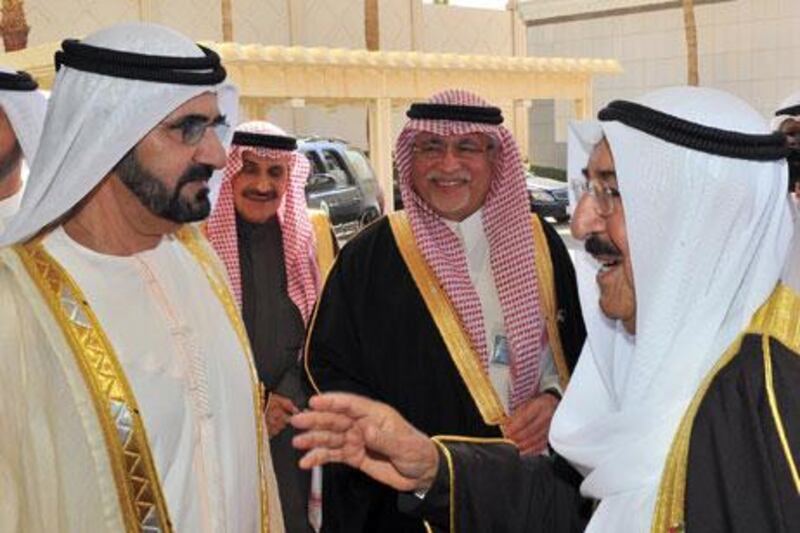With a year of upheaval in the Middle East drawing to a close and more turmoil predicted for the year ahead, Iranian adventurism tops the concerns of Gulf leaders.
That is the message of King Abdullah bin Abdulaziz Al Saud of Saudi Arabia in his call for the formation of an "entity" to confront perils to the region's stability.
"Our security and stability are threatened and we need to live up to our responsibilities," King Abdullah told the summit of the Gulf Cooperation Council on Monday, the first such meeting of the region's heads of state since the start of the Arab Spring. "Our summit opens in the shadow of challenges that require vigilance and a united stance."
The Saudi monarch offered no details of his proposed "union". Analysts say, however, that his chief concern is clear.
"There's the sectarian Iraqi problem, the Syrian implosion and the crisis in Egypt," said Theodore Karasik, enumerating the region's contentious issues.
Nevertheless, "if you rank them, Iran would be number one" for Saudi Arabia and the GCC, said Mr Karasik, director of research at the Institute for Near East and Gulf Military Analysis in Dubai. At the conclusion yesterday of the two-day summit in the Saudi capital, the GCC underscored its impatience with Iran, calling on the Islamic republic to stop meddling in the group's affairs and warning against Tehran's attempts to "instigate sectarian strife".
"Stop these policies and practices ... and stop interfering in the internal affairs" of the Gulf nations, the GCC said in a closing statement. Unlike the king's speech, the bloc's closing statement mentioned Iran by name.
King Abdullah's appeal for stronger measures to ensure security came at the end of a year during which the GCC deployed security forces to Bahrain to help restore order in the face of Shiite-dominated, pro-reform protests. Still, it was not home-grown dissidence but Iranian-inspired and Iranian-sponsored subversion that worried GCC leaders the most, analysts say.
Shiite-led Iran maintains close ties with Syria and funds Lebanon's Hizbollah. It has also increased its influence in neighbouring Iraq with the departure of US troops and continues to enrich uranium in defiance of United Nations resolutions. Iran's recent threat to shut the Strait of Hormuz, meanwhile, caused concern among GCC oil exporters.
Gulf states have also pointed to accusations by the US that Iran backed a plot to assassinate the Saudi ambassador in Washington as proof of Iran's intent to destabilise the region.
Iran is not a new concern for Gulf leaders. The GCC was created in 1981 to counterbalance Iranian aggression during the Iran-Iraq war. Tehran says the GCC's renewed focus on alleged Iranian interference is unfounded and accuses Sunni-led Gulf states of mistreating their Shiite populations.
While King Abdullah in his speech on Monday did not spell out the potential mechanisms for increased GCC cooperation, his comments came just two weeks after a senior Saudi diplomat, former intelligence chief Prince Turki Al Faisal, made a similar plea. Speaking at a forum on Gulf relations in Riyadh on December 5, Prince Turki identified specific areas in which GCC states should deepen their cooperation.
These included establishing an elected regional majlis, adopting a single currency, creating a GCC-wide defence industry and "building of a unified military force, with a clear chain of command".
Prince Turki also said that if Iran obtained nuclear weapons the GCC should "study, seriously, all of the available options, including acquiring WMDs so that future generations will not blame us for neglecting any courses of action that will keep looming dangers away."
Few analysts expect the GCC to use force to counter Iran's bid for greater regional influence. For now, American military power in the region remains a strong deterrent to Iranian aggression. American warships regularly patrol the Gulf, Bahrain is home to the US 5th Fleet, and until this week, thousands of soldiers were stationed in Iraq.
This power is being scaled back. An official with the US administration last week confirmed that the US military presence in the Gulf is set to shrink now that the Iraq war is over.
"I don't think we're looking to reallocate our military footprint in any significant way from Iraq," Ben Rhodes, the deputy national security adviser for strategic communications, said. "They won't be reallocated to other countries in the region in any substantial numbers."
That means responsibility for regional security will increasingly be in the hands of GCC states. Khalid Almezaini, a research fellow at the University of Cambridge and an expert on UAE foreign policy, says Gulf states would prefer not to use force to defend their interests against Iranian aggression.
Nor is there much appetite to further tighten economic sanctions, especially in the UAE, where business ties with Iran are strong.
That leaves political isolation - and increased defensive security - as the GCC's primary tools to repel Iranian advances. The GCC members concluded their two-day meeting with a pledge to study and report back on the idea of greater unity by March.





